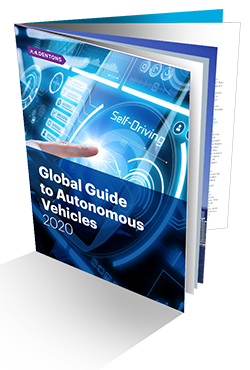As consumers and businesses eagerly anticipate a future in which next-generation autonomous vehicles (AVs) change the definition of mobility as we know it, global automakers and technology companies are investing heavily in AV research and development. Simultaneously the laws and regulations governing the technology and its deployment are rapidly evolving and becoming increasingly complex, leaving unanswered questions around safety, liability, privacy and security.
Drawing on the knowledge and resources of its global, multidisciplinary Autonomous Vehicles practice, Dentons’ “Global Guide to Autonomous Vehicles 2020” dissects the front-burner policy issues, legislative and regulatory changes, new legal precedents and leading global trends shaping the sector.
In particular, the guide focuses on the following seven countries whose governments or automotive and technology industries have taken unique approaches to supporting the nascent autonomous vehicles industry:
- Australia
- Canada
- China
- Germany
- New Zealand
- United Kingdom
- United States
For each country, the report examines five key areas: regulatory landscape; driverless vehicle testing and deployment; liability; data privacy and security; and telecommunications and 5G.
Key findings
Governments around the globe, both large and small, must answer the complex technical, legal and regulatory questions plaguing full autonomy. Some of the key findings across the globe include:
- Australia requires significant investment to upgrade its infrastructure, including communications and data access. Some municipalities are actively working toward this effort with defined plans of action and budget estimates.
- Ontario leads testing and development of AV technology in Canada, while the federal government has focused on ensuring consistency across all jurisdictions.
- The Chinese government has taken multiple steps to prepare national infrastructure for autonomous vehicles, including defining action plans, publicly soliciting opinions on strategy, promoting relevant research and preparing the streets for autonomous transit.
- Germany has established a national strategy for AVs but its federated structure may threaten consistency at the country level.
- The New Zealand government encourages the testing of semi and fully autonomous vehicles, as well as other transport technologies and innovations in order to facilitate early adoption of beneficial technology.
- Recognizing a communications framework will be essential for AVs, the U.K. has developed a focused strategy to become a global leader in 5G technology, including spectrum allocation.
- In the United States, there is no federal regulatory framework currently in place to address autonomous vehicle testing and deployment. As a result, testing and deployment is regulated by a patchwork of statecentric laws. Forty states and the District of Columbia have either passed autonomous vehicle legislation or are operating under executive orders.
We hope that Dentons’ Global Guide to Autonomous Vehicles provides you with a closer look at the developing political and legal landscape for autonomous vehicles, and the specific opportunities and challenges across key areas that will define the global mobility revolution.
If you have questions regarding any of the covered countries, the guide includes the names and contact details of local lawyers and professionals who can help you. If you have questions of a more general nature, about the guide or the sector overall, please feel free to contact our Autonomous Vehicles practice leader via email at eric.tanenblatt@dentons.com.
USEFUL LINKS
- Check out Dentons’ newsfeed aggregating the latest stories on self-driving vehicles.
- Learn more about Dentons and The Driverless Commute
- Follow Dentons on LinkedIn and Twitter







